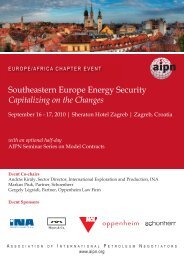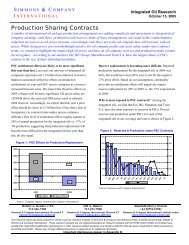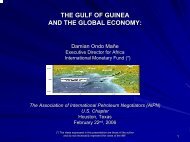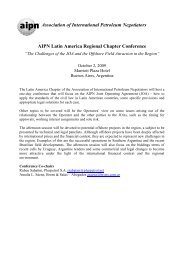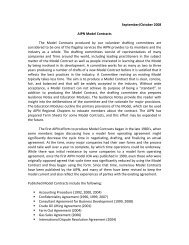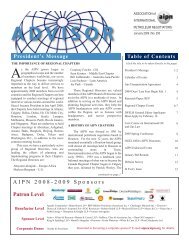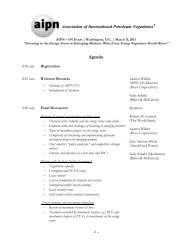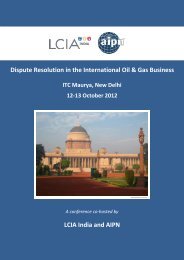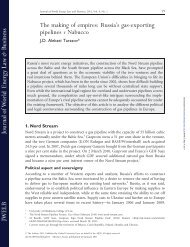ADVISOR - AIPN
ADVISOR - AIPN
ADVISOR - AIPN
Create successful ePaper yourself
Turn your PDF publications into a flip-book with our unique Google optimized e-Paper software.
EDUCATION<br />
Journal of World energy Law & Business<br />
September 2012 - Login to www.aipn.org and click on the Journal link to access the full articles<br />
Energy, economy and other global challenges<br />
James A. Baker III<br />
James A. Baker III is an American attorney, politician and political<br />
advisor. He was Secretary of State under George H W Bush.<br />
This article is the unedited text of a speech delivered by James<br />
A. Baker III at the <strong>AIPN</strong> Spring Conference in Washington D.C. on<br />
19 April 2012.<br />
Lex Petrolea and the internationalization of<br />
petroleum agreements: focus on Host<br />
Government Contracts<br />
Kim Talus, Scott Looper and Steven Otillar<br />
This article focuses on two separate but interrelated themes and<br />
discussions: Lex Petrolea and the standardization of<br />
international petroleum agreements. Both themes relate to the<br />
same phenomena: the internationalization of various legal and<br />
contractual aspects of the petroleum industry.<br />
How France shares the nuclear rent: a<br />
presentation of the NOME Act<br />
Sylvain Bergès<br />
For many years the largest operators in Europe have been<br />
attempting unsuccessfully to enter into the French electricity<br />
market. Many of them have developed production facilities in<br />
order to compete with established operators (ie EDF and GDF<br />
Suez). To accelerate the opening of the French market and<br />
enable fair competition with EDF, the French government has<br />
now created a means of third-party access to nuclear power<br />
electricity. If the legal mechanism allowing such access is<br />
effective, it should create real competition in the French<br />
electricity market.<br />
Foreign direct investment mechanisms and<br />
review of Iran’s buy-back contracts: how far has<br />
Iran gone and how far may it go?<br />
Maximilian Kuhn and Mohammadjavad Jannatifar<br />
For political reasons, Iran’s role in global energy politics is<br />
constantly declining as three decades of internal divisions,<br />
coupled with crippling international sanctions, have left Iran<br />
unable to capitalize on its vast energy potential. However, once<br />
these political issues have been resolved one way or the other,<br />
SEPTEMBER 2012 • 30<br />
the second most important issue will remain: the direct<br />
investment mechanism for foreign investment into the Iranian<br />
energy sector—the buy-back contracts. This article sheds light<br />
on Iranian concessions, contracts and other forms of investment<br />
developed, and analyses their legal basis. We review the<br />
objectives of the buy-back concept and provide a historical<br />
perspective of its development. We advocate a fundamental<br />
change of the investment climate by providing incentives<br />
(financial, economical, tax) and amending the buy-back formula<br />
through a ‘new method’ to attract local and foreign investment.<br />
The new legal framework for oil and gas<br />
activities near the maritime boundaries<br />
between Mexico and the U.S: comments on the<br />
Agreement between the United Mexican States<br />
and the United States of America concerning<br />
transboundary hydrocarbon reservoirs in the<br />
Gulf of Mexico<br />
José Luis Herrera Vaca<br />
On 20 February 2012, the U.S. and Mexico signed the Agreement<br />
between the United Mexican States and the United States of<br />
America Concerning Transboundary Hydrocarbon Reservoirs in<br />
the Gulf of Mexico (the ‘Agreement’).1 This Agreement—while<br />
not in force yet2—is the first serious governmental attempt3 to<br />
establish a set of rules governing the exploitation of oil and gas<br />
reservoirs in what both countries see as a real possibility in the<br />
Gulf of Mexico: shared deposits. The Agreement provides for the<br />
joint, efficient and equitable exploitation of such reservoirs.4<br />
This article outlines the main features of the exploitation of<br />
transboundary hydrocarbon reservoirs provided for in the<br />
Agreement, new possibilities for cooperation and business<br />
development between oil and gas companies5 along the<br />
maritime boundaries whether or not transboundary<br />
hydrocarbon reservoirs are in place and whether companies<br />
really need these provisions, or whether exploration of shared<br />
deposits could successfully take place without the Agreement.<br />
Colombia’s regulatory and fiscal hydrocarbons<br />
regime: explaining Colombia’s success and the<br />
challenges ahead<br />
Carlos Bellorin Nuñez<br />
This article deals with Colombia’s current fiscal and contractual<br />
petroleum regime and how solid institutions have played a role<br />
in the country’s success in increasing its oil production in a




